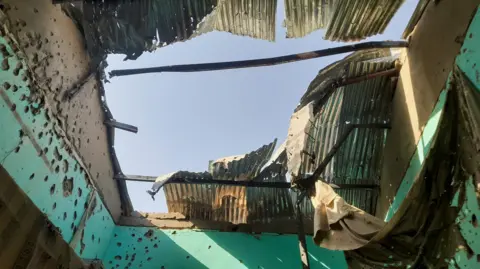Deep in the heart of Sudan’s embattled Darfur region, where the wounds of civil war run as deep as the ancient Nile itself, a devastating artillery attack has claimed thirteen innocent lives at one of el-Fasher’s last functioning hospitals.
The Saudi Hospital, a lifeline for thousands of trapped civilians, came under direct fire Tuesday night from the Rapid Support Forces (RSF), a paramilitary group that has held this desert city in a chokehold for more than 17 months. Among the sixteen wounded were medical professionals – the very healers trying to keep hope alive in this besieged community.
What we’re witnessing here, folks, is more than just another tragedy in a far-off land. The attack left behind a tableau of destruction that tells its own story: shattered windows, walls pockmarked with shrapnel, and hospital beds twisted like pretzels in a Texas summer. Medical professionals on the ground are calling it what it is – a war crime.
This marks the second time this year the Saudi Hospital has been targeted. In January, three children lost their lives in a similar attack. Now, with several wards destroyed, the situation for el-Fasher’s trapped civilians grows more desperate by the hour.
But there’s more to this story than meets the eye. Recent satellite imagery reveals the RSF has completed construction of a 35-mile earthen wall around el-Fasher, effectively sealing all major escape routes. This siege tactic, reminiscent of medieval warfare, has trapped hundreds of thousands of civilians in what amounts to an open-air prison.
Those brave souls who attempt to flee face a gauntlet of horrors at RSF checkpoints – extortion, arbitrary detention, disappearances, and sexual violence. Meanwhile, humanitarian aid convoys carrying essential supplies sit idle, blocked from reaching those in desperate need.
The United Nations’ High Commissioner for Human Rights, Volker Türk, put it plainly last week: el-Fasher stands on the precipice of catastrophe. After 500 days under siege, this city of trapped civilians needs more than just international concern – it needs immediate action.
This is a story that cuts to the heart of human dignity and the rules of war. As someone who has covered conflicts across this troubled world for decades, I can tell you that what’s happening in el-Fasher isn’t just another distant tragedy – it’s a test of our collective conscience.
And that’s the way it is in Sudan today, where the difference between life and death often comes down to which way the artillery is pointing, and whether the world is watching.


